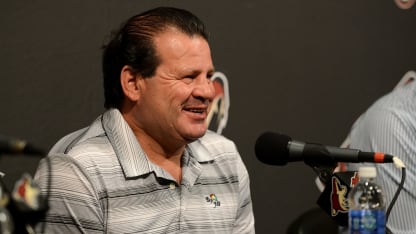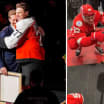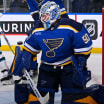NHL.com's Q&A feature called "Five Questions With …" runs every Tuesday. We talk to key figures in the game and ask them questions to gain insight into their lives, careers and the latest news.
The latest edition features Mike Eruzione, captain of the gold medal-winning 1980 U.S. Olympic Team.
Five Questions with Mike Eruzione
Captain of 1980 U.S. Olympic Team discusses impact of Miracle on Ice 40 years later

© Jennifer Stewart/Getty Images
The Miracle on Ice is about to turn 40.
It's been four decades since the underdog United States, with Mike Eruzione as its captain, defeated the Soviet Union 4-3 at the Lake Placid Olympics on Feb. 22, 1980, a game viewed by many as the greatest upset in the history of sports. Two days later, on Feb. 24, the United States rallied to defeat Finland 4-2 and win the unlikeliest of gold medals, setting off a wild celebration across a country that was being rocked by the Iran hostage crisis, high inflation, gas shortages and the Cold War with the Soviet Union.
The 1980 team will get together this week in Las Vegas for a two-day reunion that's being hosted by the Vegas Golden Knights. All but two of the players on the team are expected to be there: Bob Suter died in 2014 and Mark Pavelich is hospitalized. Coach Herb Brooks died in an auto accident in 2003.
Eruzione said the bond among members of the 1980 team is still strong.
"When we get together, it's the most immature people in the world," he said of past reunions. "If you saw some of the emails and texts that go back and forth; we're in our 60s now, you would think we were 12. There's that bond and friendship that we'll always have.
"I'm looking forward to getting together with the guys. It'll be awesome. It's going to be in Vegas. Vegas does do celebrations pretty well. We won't talk about Lake Placid. When we get together, it's never discussed, hardly ever. It's usually, 'How's your golf game? How's the kids? You went hunting last year, did you get any deer? Did you get any fish?' Those are the things we talk about. Very rarely will we sit down and say, 'Hey, you remember what Herb said to us' or 'Do you remember this goal that Mark [Johnson] scored.' That hardly ever comes up in conversation."
Eruzione, who scored the game-winning goal in the win against the Soviet Union, is also marking the 40th anniversary with the release of his autobiography, "The Making of a Miracle: The Untold Story of the Captain of the 1980 Gold-Medal Winning U.S. Olympic Hockey Team." The book, co-written by Neal E. Boudette and published by HarperCollins, was released on Jan. 28
Here are Five Questions with … Mike Eruzione.
Why this book -- and why now?
"It's a couple of reasons, actually. Neil Boudette approached me about writing a book about the 1980 team 40 years later and the guys on the team really weren't interested in writing a book. I decided to do it for one reason, and I say that in the book. I have five grandkids and I want my grandkids to know Poppa's life wasn't just two weeks in Lake Placid. I want my grandkids to know more about what took place -- not so much on the ice, but how I grew up, my family, my dad, my mom, my cousins, the house environment, how I ended up at Boston University, how I ended up on the Olympic team. There were a lot of things that I wanted to tell that I wanted them to know. And if people enjoy the book, that's great. I'm hoping a lot of people buy it, enjoy it and like it. But the basic reason behind it was I want my grandkids to know that Poppa didn't live just two weeks."
Why do you believe the Miracle on Ice is still being celebrated 40 years after the fact?
"I think it speaks volumes to what that moment meant to people, not just the hockey fan. For 40 years, I've been dealing with it. I still travel around the country, I do a lot of corporate outings, a lot of speaking, playing in a lot of golf tournaments. I meet a ton of people and everybody's got a story to tell. I've had people come up to me and literally start crying because that moment meant something to them, whether it was the last time they watched the game with their mother or father or their grandfather or grandmother or as a family. I've had soldiers, Vietnam veterans, come up to me and talk about how they just thought their whole lives were ruined after they come back from Vietnam and there was no faith in the country. All of a sudden, we come along and renewed that faith and that belief in the United States. The gamut of stories run from it meant something to them personally, emotionally, it meant something to them politically, or it meant something to them as a hockey game. Again, it's not Chicago or Boston or Detroit. It's the United States. We represented the whole country. And I've said this many times: I'm a New England Patriots fan, I love the Patriots. I love my Red Sox and Celtics and Bruins. But when it's the Olympic Games, it's a nation that feels a part of it. And I think that's what made our moment still so special. We captured the spirit of a country."
Ken and EJ reflect on team USA's 'Miracle on Ice'
Personally, how, how powerful is that legacy -- to have that opportunity or that responsibility to hear all these stories and be the witness?
"I don't think it's a responsibility. I think we take great pride in knowing that we touched people's lives and you enjoy it. It's not like we did anything wrong. When people come up to me and tell me they remember, and it almost goes the same way: I remember, depending on their age, I remember where I was when [President John] Kennedy was assassinated. I remember when Challenger blew up. I remember 9-11 …. They remember these tragic moments. Then they'll go, 'I remember where I was when we won.' And I always say, 'We?' I didn't know you were on the team [laughing]. But it meant a lot to people. So maybe that's the whole story behind this thing. Our responsibility, for me, is to make sure that if somebody wants to talk about it, I have no problem sitting down and telling them, 'Thank you, and thank you for thinking of us and remembering us.' I see the smile and the joy that it brings to people and it's nice to know you were part of the moment that was able to do that."
A lot of people have said that it's the greatest upset in the history of sports. Do you believe it's an upset and, if you do, Is it the greatest one?
"I think it was clearly an upset. We were probably a six-goal underdog, not a one-goal underdog. I guess, how do you categorize great upsets? NHL players playing against NHL teams? Those aren't upsets, those are somewhat upsets, but it's not like this. You know, a college football team being a 20-point underdog and winning the game; it's still college players playing against college players. Do I think it was the greatest upset in the history of sports? Absolutely -- and I'm biased. But I believe that because of what was taking place and who the Soviets were, professionals playing against college players, amateurs playing against professionals. You don't see that anymore. You're probably never going to see that again. I think at the time, it was a great upset. It was a great moment. For a lot of other reasons, I think it made it the greatest moment in sports history and the greatest upset. It wasn't just an athletic achievement. It wasn't just a hockey game. It was more than that. And I think that's why the game separates itself from any other athletic achievement that goes on in sports."
Eruzione tells stories about the Miracle on Ice
The growth of hockey in the United States can be drawn almost in a straight line from what you guys did in Lake Placid to today and what the great young Americans like Auston Matthews and Jack Eichel and others are doing now. Do you feel a sense of pride that there is a legacy from the 1980 team?
"I haven't met Auston Matthews yet. Hopefully someday I will, because he's one of the next great American superstars. I got a chance to meet Jack [Eichel] because he played at Boston University. He's a Boston kid. I don't think the [younger players] have any relationship to the 1980 team. They probably saw the movie 'Miracle,' but I think that the Jeremy Roenicks and the Keith Tkachuks, the Pat LaFontaines, the Eddie Olczyks, and Chris Chelios and Brian Leetch, those guys probably have a little more relationship to the '80 team because they were young, they were starting to play the game then. I've said it many times: In 1980 we might have opened the door, but today's players have knocked the door down. We go into a tournament now, whether it's the Olympic Games or World Championships, we are one of the favorites. I think those superstars today, the Americans, they don't probably have that much of a clue [about] 1980 other than the movie 'Miracle.' But the players that followed us, they probably have a little more understanding. Jeremy Roenick said it many times: When he was in his backyard, he was Mike Eruzione. Pat LaFontaine has said that to me as well. Tony Amonte said he was Mike Eruzione and then when he realized how good Mark Johnson was, he said he should have been Mark Johnson. So those are the players that related to what to what we did. Today's players probably have an idea, but not as close as those other players."

















